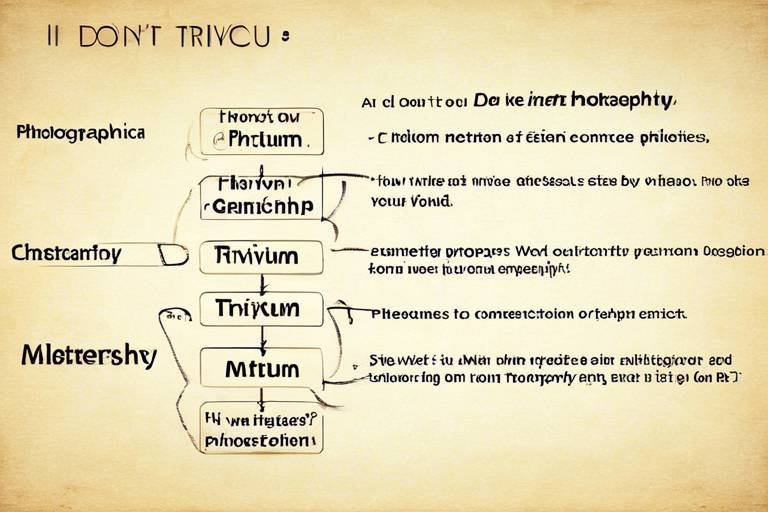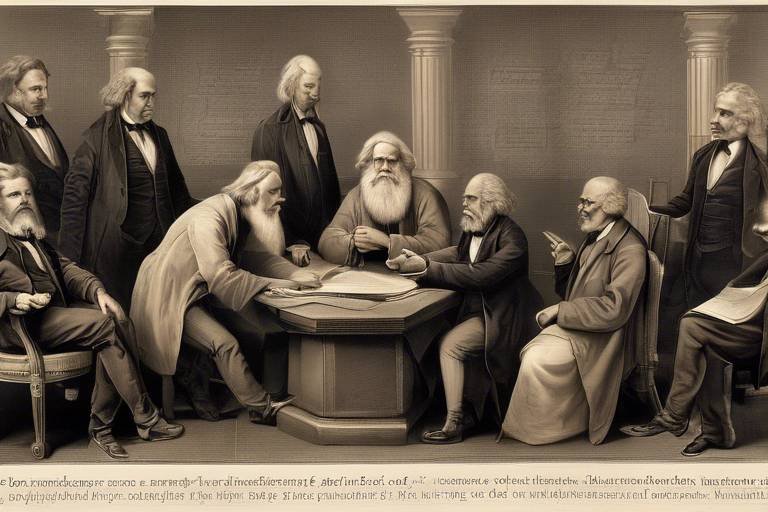Empiricism and Its Influence on Scientific Methods
Empiricism is not just a philosophical concept; it's a powerful lens through which we can understand the world around us. Imagine trying to navigate through life without the guidance of your senses. Every time you touch, see, or hear something, you are gathering information that shapes your understanding of reality. This article explores the philosophical foundation of empiricism and its significant role in shaping modern scientific methodologies, emphasizing observation, experimentation, and evidence as key components of knowledge acquisition. By examining the principles of empiricism, we can appreciate how it serves as the backbone of scientific inquiry and the quest for knowledge.
At its core, empiricism posits that knowledge comes primarily from sensory experience. This stands in stark contrast to rationalism, which suggests that reason and innate ideas are the primary sources of knowledge. To truly grasp the essence of empiricism, we must look back at the historical thinkers who laid the groundwork for this philosophical approach. From ancient philosophers to modern thinkers, the emphasis on observation and experience has remained a constant theme. It raises an intriguing question: how do our senses shape our understanding of the universe? The answer lies in the rich tapestry of ideas woven by those who championed empiricism.
Several prominent philosophers have played pivotal roles in the development of empiricism. Among them are John Locke, David Hume, and George Berkeley. Each of these thinkers contributed uniquely to the discourse surrounding knowledge and experience. Their ideas not only challenged existing notions of reality but also paved the way for modern scientific inquiry. For instance, Locke's notion of the mind as a blank slate suggests that our experiences mold our understanding, while Hume's skepticism invites us to question the very foundations of causation and induction. Together, they form a triad of thought that continues to influence how we perceive knowledge today.
John Locke's contributions to empiricism are profound and far-reaching. His theory of tabula rasa, or "blank slate," posits that individuals are born without innate ideas, and that knowledge is instead acquired through experience. This radical idea shifted the focus of epistemology, emphasizing the importance of sensory experiences in shaping our understanding of the world. Locke argued that the mind begins as a blank canvas, where every experience paints a new stroke of knowledge. This perspective not only revolutionized philosophy but also laid the groundwork for modern educational practices.
Locke's exploration of primary and secondary qualities further illustrates his impact on empirical philosophy. Primary qualities, such as shape and motion, exist independently of perception, while secondary qualities, like color and taste, are dependent on the observer's senses. This distinction has significant implications for our understanding of perception and reality. For example, consider how two people might perceive the same apple differently based on their individual sensory experiences. This idea challenges us to think critically about the nature of reality and how our perceptions can shape our understanding of it.
Locke's empirical principles extend beyond philosophy into the realm of education. His advocacy for experiential learning highlights the importance of observation in the learning process. Imagine a classroom where students engage in hands-on activities rather than passively absorbing information from textbooks. This approach not only fosters a deeper understanding of concepts but also encourages critical thinking and creativity. By prioritizing experience, Locke's educational philosophy aligns perfectly with the scientific method, where observation and experimentation are key to discovery.
David Hume, another monumental figure in empirical philosophy, introduced a level of skepticism that challenged the very foundations of empirical methods. His inquiries into causation and induction prompted a re-evaluation of how we understand human reasoning. Hume questioned whether we can truly establish cause-and-effect relationships based solely on empirical evidence. For instance, just because we observe that the sun rises every morning does not guarantee that it will rise tomorrow. This skepticism encourages a more profound investigation into the nature of human understanding and the limits of what we can know through empirical evidence.
Fast forward to the present day, and we see that empiricism has profoundly influenced contemporary scientific methods. The scientific method itself is a systematic approach that emphasizes observation, experimentation, and the validation of theories through evidence. This rigorous methodology has become the gold standard for scientific inquiry, allowing researchers to test hypotheses and draw conclusions based on observable phenomena. In a world where misinformation can spread like wildfire, the reliance on empirical evidence serves as a beacon of truth, guiding us through the complexities of scientific exploration.
Experimentation is the cornerstone of empirical research, providing scientists with the tools to test their hypotheses and gather data. Through controlled experiments, researchers can isolate variables and observe their effects, leading to robust conclusions. Think of it like a chef perfecting a recipe; by adjusting ingredients and cooking times, they can discover the ideal combination. Similarly, scientists use experimentation to refine their understanding of natural phenomena, ensuring that their findings are both reliable and valid.
Effective data collection and analysis are essential to empirical methods. Various methodologies, such as surveys, observational studies, and controlled experiments, are employed to ensure accuracy and reliability in findings. For example, consider a clinical trial testing a new medication. Researchers meticulously collect data on participants' responses, analyze the results, and draw conclusions based on empirical evidence. This rigorous approach not only enhances the credibility of scientific research but also fosters trust in the findings presented to the public.
- What is empiricism? Empiricism is a philosophical theory that asserts that knowledge comes primarily from sensory experience.
- Who were the key figures in empiricism? Key figures include John Locke, David Hume, and George Berkeley, each contributing uniquely to the philosophy.
- How does empiricism influence modern science? Empiricism underpins the scientific method, emphasizing observation, experimentation, and evidence in knowledge acquisition.
- What is the significance of experimentation in science? Experimentation allows scientists to test hypotheses and gather data, leading to reliable conclusions and advancements in knowledge.

The Foundations of Empiricism
Empiricism stands as one of the cornerstones of modern philosophy, fundamentally shaping how we perceive and understand the world around us. At its core, empiricism asserts that knowledge arises from sensory experience, contrasting sharply with rationalism, which posits that reason and innate ideas are the primary sources of knowledge. This philosophical approach invites us to engage with the world through observation and experimentation, allowing us to gather evidence that forms the basis of our understanding.
Historically, the roots of empiricism can be traced back to ancient Greek philosophers, but it really blossomed during the Enlightenment. Thinkers like John Locke, David Hume, and George Berkeley championed the idea that our experiences shape our knowledge. They argued that rather than being born with a set of inherent ideas, the human mind is more like a blank slate—a tabula rasa—waiting to be inscribed with the impressions of the world. This notion revolutionized not only philosophy but also fields like psychology and education, as it highlighted the importance of experience in the learning process.
To better understand the foundations of empiricism, it's essential to look at its key principles:
- Observation: Empiricists emphasize the importance of observing the natural world as a means of acquiring knowledge.
- Experimentation: Testing hypotheses through controlled experiments is crucial in validating or refuting claims.
- Evidence: Knowledge must be supported by empirical evidence, which can be measured and analyzed.
This empirical approach has profound implications for scientific inquiry. It encourages a systematic method of investigation, where theories must be tested against observable phenomena. The emphasis on evidence-based conclusions has led to significant advancements in various scientific fields, from physics to biology, where hypotheses are rigorously tested to ensure their validity.
As we delve deeper into the contributions of key figures in empirical philosophy, we will see how their ideas laid the groundwork for modern scientific methods. Their emphasis on sensory experience and evidence continues to resonate in contemporary research practices, reminding us that our understanding of the universe is not merely a product of thought but a reflection of the world we actively engage with.

Key Figures in Empirical Philosophy
When we delve into the rich tapestry of empirical philosophy, we can't help but encounter a few towering figures whose ideas have left an indelible mark on our understanding of knowledge and experience. These thinkers, each with their unique perspectives, have shaped the way we perceive the world around us. Among them, John Locke, David Hume, and George Berkeley stand out as pivotal contributors to the development of empiricism. Their insights not only challenged existing notions but also paved the way for modern scientific inquiry.
First up, we have John Locke, often regarded as the father of empiricism. Locke's philosophy revolves around the idea that the mind is a tabula rasa, or blank slate, at birth. He argued that all knowledge is derived from sensory experience. Imagine starting life with a clean canvas, where every experience adds color and depth to your understanding of the world. This radical notion was a stark contrast to the rationalist view, which posited that knowledge could be gained through reason alone. Locke's emphasis on observation and experience laid the groundwork for the empirical approach that we see in scientific methods today.
Next, we encounter David Hume, a philosopher whose skepticism about causation and induction shook the very foundations of empirical thought. Hume argued that our understanding of cause and effect is not based on logical reasoning but rather on habit and experience. He famously questioned how we can ever truly know that one event causes another, suggesting that our beliefs in causation are merely the result of repeated observations. This skepticism pushed philosophers and scientists alike to scrutinize the assumptions underlying empirical research, leading to a more rigorous examination of evidence and methodology.
Then we have George Berkeley, whose idealism introduced a fascinating twist to the narrative of empiricism. Berkeley proposed that reality is fundamentally tied to perception; in his view, to be is to be perceived. This means that the existence of objects is dependent on their being observed. Imagine a tree falling in a forest with no one around to hear it—according to Berkeley, it might as well not exist! His ideas challenged the notion of an objective reality independent of our experiences, urging us to consider the role of perception in shaping our understanding of the world.
In summary, the contributions of these key figures—Locke, Hume, and Berkeley—have profoundly influenced the discourse surrounding knowledge and experience. Their ideas not only shaped the trajectory of empirical philosophy but also laid the groundwork for modern scientific methods. As we continue to explore the implications of their theories, we find ourselves better equipped to navigate the complexities of knowledge acquisition in an ever-evolving world.
- What is empiricism? Empiricism is a philosophical theory that emphasizes the role of sensory experience in the formation of ideas, contrasting with rationalism, which relies on reason and innate knowledge.
- Who is considered the father of empiricism? John Locke is often referred to as the father of empiricism due to his influential theories on knowledge acquisition and the mind as a blank slate.
- What did David Hume contribute to empiricism? David Hume introduced skepticism regarding causation and induction, challenging the assumptions of empirical research and prompting deeper investigations into human understanding.
- How did George Berkeley's ideas differ from other empiricists? Berkeley's idealism posited that reality is dependent on perception, suggesting that objects only exist if they are perceived, which contrasts with the idea of an objective reality.

John Locke's Contributions
John Locke, often hailed as the father of empiricism, made profound contributions that laid the groundwork for modern philosophy and scientific thought. His revolutionary ideas about the nature of knowledge fundamentally changed how we perceive learning and understanding. Locke's assertion that the mind is a tabula rasa, or blank slate, at birth was a radical departure from the prevailing notions of innate ideas. Instead of being born with pre-existing concepts, Locke argued that individuals acquire knowledge through their sensory experiences. This perspective not only democratized knowledge but also emphasized the importance of education and personal experience in shaping our understanding of the world.
Locke's theory of knowledge is particularly noteworthy. He distinguished between primary qualities, which are inherent to an object (like shape and motion), and secondary qualities, which are dependent on the observer's perception (like color and taste). This distinction is crucial as it highlights the subjective nature of human experience. For instance, consider how a ripe apple may appear red to one person and greenish to another under different lighting conditions. This leads us to ponder: if our perceptions can vary so greatly, what does that say about the nature of reality itself?
Furthermore, Locke’s ideas extended beyond philosophy into the realm of education. He championed the concept of experiential learning, advocating that students should engage with their environment and learn through observation and interaction rather than rote memorization. This approach not only fosters critical thinking but also encourages curiosity, making learning a more dynamic and engaging process. Locke believed that when students are allowed to explore and discover, they develop a deeper understanding of the material. In essence, he argued that knowledge is not merely imparted but constructed through experience.
To summarize Locke's contributions, we can look at the following key points:
- Tabula Rasa: The mind is a blank slate at birth, shaped by experiences.
- Primary and Secondary Qualities: Differentiation between inherent and perceived properties of objects.
- Experiential Learning: Advocating for education that emphasizes observation and interaction.
Locke's influence is evident not just in philosophy but also in the fields of psychology and education. His empirical approach encourages us to question our assumptions and seek knowledge through direct experience. By challenging the way we think about learning, Locke has left an indelible mark on how we understand the acquisition of knowledge today.

Locke's Theory of Knowledge
John Locke, a pivotal figure in the realm of empiricism, proposed a revolutionary theory regarding the acquisition of knowledge that fundamentally shifted how we perceive learning and understanding. At the heart of Locke's philosophy is the concept of tabula rasa, or the "blank slate." He argued that individuals are born without innate ideas, and instead, their knowledge is shaped entirely by their experiences. This idea was radical at the time, as it challenged the prevailing notions of rationalism, which posited that certain truths were inherent and could be accessed through reason alone.
Locke distinguished between two types of qualities: primary qualities and secondary qualities. Primary qualities are those that exist within an object, such as shape, size, and motion. They are objective and can be measured. In contrast, secondary qualities, like color, taste, and sound, do not reside in the objects themselves but are the result of sensory perceptions. This distinction is crucial because it highlights how our understanding of the world is mediated through our senses, reinforcing the idea that knowledge is not a mere reflection of reality but rather a complex interplay between the observer and the observed.
To illustrate Locke's theory, consider a simple example: when you look at an apple, its primary qualities—such as its round shape and red color—are properties that can be objectively described. However, your perception of its sweetness, a secondary quality, is subjective and varies from person to person. This interaction between primary and secondary qualities underscores Locke's assertion that our knowledge is fundamentally experiential and shaped by our interactions with the world.
Locke's influence extends beyond philosophy and into the realm of education. He believed that learning should be rooted in experience, advocating for methods that emphasize observation and practical engagement. This approach laid the groundwork for modern educational practices, where hands-on learning and experiential activities are recognized as vital components of effective teaching. In essence, Locke's theory not only reshaped philosophical discourse but also had a lasting impact on how knowledge is imparted and acquired in educational settings.
In summary, Locke's contributions to the theory of knowledge highlight the importance of sensory experience in shaping our understanding of the world. His distinctions between primary and secondary qualities provide a framework for examining how we perceive reality, while his advocacy for experiential learning continues to resonate in contemporary educational practices. By embracing the idea of the mind as a blank slate, Locke invites us to explore the richness of our experiences as the foundation for knowledge.

Locke's Impact on Education
John Locke's contributions to education are nothing short of revolutionary. He believed that the mind is a blank slate at birth, a concept known as tabula rasa. This idea implies that all knowledge comes from experience and sensory perception. In educational contexts, Locke championed the notion that learning should be rooted in practical experiences rather than rote memorization. This was a radical departure from the prevailing educational methods of his time, which often emphasized strict discipline and the memorization of classical texts.
Locke argued that children learn best when they are engaged in active learning, where they can explore, question, and interact with their environment. He believed that education should not merely fill students with facts but should also cultivate their ability to think critically and develop their own understanding of the world. This approach aligns closely with modern educational practices that prioritize experiential learning and hands-on activities.
Moreover, Locke stressed the importance of observation in the learning process. He posited that students should be encouraged to observe the world around them, draw conclusions from their observations, and discuss their findings with others. This method not only enhances understanding but also fosters a sense of curiosity and a desire for lifelong learning. Imagine a classroom where students are not just passive recipients of knowledge but active participants in their education, much like explorers discovering new lands!
To illustrate Locke's educational philosophy, consider the following key principles:
- Experiential Learning: Learning through direct experience rather than passive reception.
- Critical Thinking: Encouraging students to analyze and evaluate information critically.
- Observation: Highlighting the importance of observing and questioning the world as a primary means of learning.
Locke's ideas laid the groundwork for modern educational theories that emphasize the role of the learner in the educational process. His influence can be seen in various contemporary educational frameworks, such as constructivism, which posits that learners construct their own understanding and knowledge of the world through experiences and reflecting on those experiences.
In summary, John Locke's impact on education cannot be overstated. His emphasis on experience, observation, and critical thinking has shaped not only educational practices but also the way we understand the learning process. By advocating for a more interactive and engaging approach to education, Locke has paved the way for future generations to learn in ways that resonate with their natural curiosity and desire for knowledge.
1. What is the tabula rasa theory?
The tabula rasa theory, proposed by John Locke, suggests that individuals are born as a blank slate, and all knowledge is acquired through experience and sensory perception.
2. How did Locke influence modern education?
Locke influenced modern education by advocating for experiential learning, critical thinking, and the importance of observation, which are now foundational elements of contemporary educational practices.
3. What is experiential learning?
Experiential learning is a process through which students learn by engaging in direct experiences, allowing them to apply knowledge in real-world situations.
4. Why is observation important in education?
Observation is crucial in education because it encourages students to engage with their environment, ask questions, and develop a deeper understanding of the concepts they are studying.

David Hume's Skepticism
David Hume, a towering figure in the realm of philosophy, is best known for his profound skepticism that shook the foundations of empirical thought. His approach challenged the very core of how we understand causation and the nature of human knowledge. Hume argued that our beliefs about cause and effect are not grounded in rational deduction but rather in habit and experience. Imagine a child witnessing the sun rise each morning; they may come to believe that the sun will rise again tomorrow, not because they have deduced it logically, but because they have observed it repeatedly. This illustrates Hume's point: our understanding of causation is built on patterns we perceive rather than definitive proof.
One of Hume's most significant contributions to philosophy is his exploration of induction—the process of deriving general principles from specific observations. He pointed out a fundamental problem: while we might observe that the sun has risen every day of our lives, there is no logical guarantee that it will rise again tomorrow. This realization leads us into a maze of uncertainty, forcing us to confront the limitations of our empirical methods. Hume’s skepticism serves as a reminder that our knowledge is often provisional, shaped by our experiences rather than absolute truths.
Hume also delved into the nature of human understanding, suggesting that our perceptions are not infallible. He famously argued that all ideas are ultimately derived from sensory experiences, which can be deceptive. For instance, when we see a stick partially submerged in water, it appears bent due to the refraction of light. Our senses can mislead us, and this raises questions about the reliability of empirical evidence. Hume's emphasis on the fallibility of human perception challenges the notion that observation alone can lead us to truth.
To illustrate Hume's skepticism further, consider the following table that outlines his key points regarding causation and induction:
| Concept | Hume's Perspective |
|---|---|
| Causation | Not a logical certainty; based on habit and experience. |
| Induction | No rational justification for assuming future events will follow past patterns. |
| Perception | Fallible; our senses can mislead us. |
Hume's skepticism has had a lasting impact on various fields, particularly science. His ideas push scientists to critically evaluate the assumptions underlying their methodologies. Are we truly observing reality, or are we simply interpreting a series of events through the lens of our own experiences? This question resonates deeply in the scientific community, where the quest for objective truth often collides with the inherent subjectivity of human perception.
Ultimately, Hume's skepticism invites us to embrace uncertainty and question our knowledge. It serves as a reminder that while empirical methods are powerful, they are not infallible. The journey of understanding is fraught with complexities, and Hume encourages us to remain vigilant and critical in our pursuit of knowledge. By acknowledging our limitations, we can strive for a deeper understanding of the world around us.
- What is David Hume's main argument regarding causation? Hume argues that our beliefs about causation are based on habit and experience rather than logical deduction.
- How does Hume view induction? He believes that induction lacks rational justification, as past experiences do not guarantee future occurrences.
- What impact did Hume's skepticism have on modern science? Hume's skepticism encourages scientists to critically evaluate their methodologies and the assumptions underlying their knowledge.

Empiricism in Modern Science
In the world of science, empiricism serves as the backbone of our understanding and exploration of the universe. It’s fascinating to think about how the principles of observation and experimentation have shaped modern scientific practices. Empiricism encourages scientists to rely on observable evidence rather than mere speculation or theoretical constructs. This approach has led to groundbreaking discoveries and a more profound understanding of natural phenomena.
The essence of empiricism lies in its insistence on data-driven conclusions. Scientists formulate hypotheses based on observations and then design experiments to test these hypotheses. This cycle of observation, experimentation, and revision is crucial for the advancement of knowledge. For instance, the scientific method, which is a systematic approach to inquiry, embodies the principles of empiricism. It emphasizes the importance of repeatability and falsifiability, ensuring that scientific claims can be substantiated through rigorous testing.
Let’s delve deeper into how empiricism manifests in modern scientific practices. One of the key components is data collection. Scientists utilize various techniques to gather data, which can range from controlled laboratory experiments to field studies in natural environments. The choice of method often depends on the nature of the research question. For example, in fields like psychology or sociology, observational studies might be employed to gather qualitative data, while in physics or chemistry, controlled experiments are more prevalent.
Moreover, the analysis of data collected is equally critical. Scientists employ statistical methods to interpret their findings, ensuring that their conclusions are not just coincidental. This reliance on statistical evidence is what makes empirical research robust and credible. To illustrate, consider the following table that outlines common data analysis techniques used in empirical research:
| Analysis Technique | Description | Common Use Case |
|---|---|---|
| Descriptive Statistics | Summarizes data through measures like mean and standard deviation. | Initial data overview |
| Inferential Statistics | Draws conclusions about a population based on sample data. | Hypothesis testing |
| Regression Analysis | Examines relationships between variables. | Predictive modeling |
| ANOVA | Compares means among multiple groups. | Experimental comparisons |
In addition to data collection and analysis, the role of collaboration in empirical science cannot be overlooked. Scientists often work in teams, combining their expertise to tackle complex problems. This collaborative spirit fosters an environment where ideas can be exchanged freely, leading to innovative solutions and new hypotheses. The modern scientific community thrives on sharing findings through journals, conferences, and online platforms, ensuring that knowledge is disseminated widely and efficiently.
In conclusion, empiricism is not just a philosophical concept; it is a vital framework that underpins the scientific method. By emphasizing the importance of observation, experimentation, and evidence, empiricism has revolutionized how we acquire knowledge and understand the world around us. As science continues to evolve, the principles of empiricism remain at its core, guiding researchers in their quest for truth.
- What is empiricism? Empiricism is a philosophical approach that emphasizes knowledge acquisition through sensory experience and evidence.
- How does empiricism influence scientific methods? It encourages reliance on observation and experimentation, forming the basis of the scientific method.
- Who are some key figures in empiricism? Influential philosophers include John Locke, David Hume, and George Berkeley.
- Why is data collection important in science? Data collection is crucial for testing hypotheses and ensuring that conclusions are based on reliable evidence.

The Role of Experimentation
Experimentation is often heralded as the backbone of empirical research, acting as a bridge between theory and observable reality. Imagine standing on the edge of a vast ocean of unknowns, with experimentation as your sturdy boat, guiding you through the unpredictable waves of scientific inquiry. It's through experimentation that scientists can test hypotheses, gather data, and ultimately draw conclusions about the world around us. Without this critical component, the scientific method would be little more than a collection of untested ideas, floating aimlessly without direction.
At its core, experimentation allows researchers to manipulate variables in a controlled environment, isolating specific factors to observe their effects. This process is essential for validating theories and ensuring that findings are not merely coincidental. For instance, consider a scientist studying the effects of a new drug. By conducting a controlled experiment, they can compare outcomes between a group receiving the drug and a control group receiving a placebo. This method not only provides clarity but also enhances the credibility of the results.
Moreover, experimentation is not a one-size-fits-all approach. Different fields of study often require unique methodologies tailored to their specific needs. Here are a few common types of experiments:
- Controlled Experiments: These involve manipulating one variable while keeping others constant to observe the effects.
- Field Experiments: Conducted in natural settings, these experiments aim to understand phenomena in real-world contexts.
- Longitudinal Studies: These experiments track the same subjects over a period of time, providing insights into changes and developments.
The importance of rigorous testing cannot be overstated. Each experiment serves as a building block in the larger structure of scientific understanding. When scientists publish their findings, they provide a roadmap for others to follow, allowing the scientific community to replicate experiments and verify results. This cycle of experimentation and validation is what propels science forward, fostering a culture of collaboration and innovation.
In conclusion, experimentation is not just a technique; it is the lifeblood of empirical research. It transforms abstract theories into concrete knowledge, allowing us to navigate the complexities of our universe with greater confidence. As we continue to explore the depths of scientific inquiry, the role of experimentation will remain paramount, illuminating the path toward discovery and understanding.
- What is the purpose of experimentation in science? Experimentation allows scientists to test hypotheses, gather data, and validate theories, ensuring that findings are reliable and accurate.
- How do scientists ensure their experiments are valid? Scientists use controlled variables, repeat experiments, and peer review to ensure the integrity and validity of their findings.
- What types of experiments are commonly used? Common types include controlled experiments, field experiments, and longitudinal studies, each serving different research needs.

Data Collection and Analysis
In the realm of empirical research, data collection and analysis stand as pivotal processes that ensure the integrity and reliability of scientific findings. Imagine embarking on a treasure hunt; without a proper map and tools, you might miss the hidden gems. Similarly, in scientific inquiry, the methods of gathering data and analyzing it are the tools that guide researchers toward valuable insights. The importance of these processes cannot be overstated, as they form the backbone of empirical methods and help validate or refute hypotheses.
Data collection can be likened to fishing; you need the right bait to catch the fish you want. In scientific research, the "bait" consists of various methodologies tailored to the specific needs of the study. These can include qualitative methods, such as interviews and focus groups, or quantitative methods, like surveys and experiments. Each method has its unique strengths and weaknesses, and choosing the right one is crucial. For instance, qualitative methods are excellent for exploring complex phenomena and understanding human experiences, while quantitative methods excel in providing measurable and comparable data.
Moreover, the tools and technologies available for data collection have evolved dramatically. In the past, researchers relied heavily on paper surveys and manual data entry. Today, we have a plethora of digital tools, such as online survey platforms and data analytics software, that streamline the process and enhance accuracy. This evolution not only increases efficiency but also broadens the scope of what can be studied. For example, big data analytics allows researchers to sift through vast amounts of information, uncovering patterns and trends that were previously invisible.
Once data is collected, the next step is analysis. This is where the magic happens, as raw data transforms into meaningful insights. Data analysis can take various forms, including statistical analysis, thematic analysis, and content analysis, depending on the nature of the data and the research questions posed. Statistical analysis, for instance, helps in identifying relationships between variables, while thematic analysis is often used in qualitative research to uncover underlying themes in the data.
To illustrate the importance of rigorous data analysis, consider the following table, which outlines common statistical methods used in empirical research:
| Statistical Method | Purpose | Example Use Case |
|---|---|---|
| Descriptive Statistics | Summarize and describe data | Calculating average test scores |
| Inferential Statistics | Make predictions or inferences about a population | Polling data to predict election outcomes |
| Regression Analysis | Examine relationships between variables | Studying the impact of study hours on exam performance |
Ultimately, the goal of data collection and analysis in empirical research is to enhance our understanding of the world around us. Just like a puzzle, every piece of data contributes to the larger picture. When researchers meticulously collect and analyze data, they not only contribute to their specific fields but also to the greater body of knowledge that drives scientific progress. By adhering to robust methodologies, scientists can ensure that their findings are not just anecdotal but are backed by solid evidence, paving the way for new discoveries and innovations.
- What is the importance of data collection in empirical research? Data collection is crucial as it provides the evidence needed to support or refute hypotheses, ensuring the validity of scientific findings.
- What are some common methods of data analysis? Common methods include statistical analysis, thematic analysis, and content analysis, each suited for different types of data.
- How has technology impacted data collection? Technology has greatly improved data collection by providing digital tools that enhance efficiency and accuracy, allowing for more comprehensive studies.
Frequently Asked Questions
- What is empiricism?
Empiricism is a philosophical approach that emphasizes the role of sensory experience in the formation of ideas, rather than relying solely on intuition or revelation. It asserts that knowledge comes primarily from our experiences and observations of the world around us.
- Who are the key figures associated with empiricism?
Some of the most influential philosophers in the realm of empiricism include John Locke, David Hume, and George Berkeley. Each of these thinkers contributed significantly to the development of empirical philosophy, shaping our understanding of knowledge and experience.
- How did John Locke influence empiricism?
John Locke proposed the idea of tabula rasa, suggesting that the mind starts as a blank slate, and knowledge is acquired through experience. His distinction between primary and secondary qualities of objects also laid important groundwork for understanding perception and reality.
- What role does experimentation play in modern science?
Experimentation is crucial in modern scientific methods as it allows researchers to test hypotheses, gather data, and draw conclusions based on observable evidence. This rigorous approach ensures that scientific findings are reliable and valid.
- How does empiricism affect educational practices?
Empiricism has significantly influenced educational philosophy by promoting experiential learning. This approach emphasizes observation and hands-on experiences, encouraging students to learn through direct engagement with their environment.
- What challenges did David Hume present to empiricism?
David Hume raised skepticism about concepts like causation and induction, questioning the reliability of empirical evidence. His inquiries prompted deeper discussions about the limits of human understanding and the nature of knowledge.
- Why is data collection important in empirical research?
Effective data collection is essential in empirical research because it ensures accuracy and reliability in findings. It allows scientists to analyze information critically and draw informed conclusions that contribute to the body of knowledge.



















